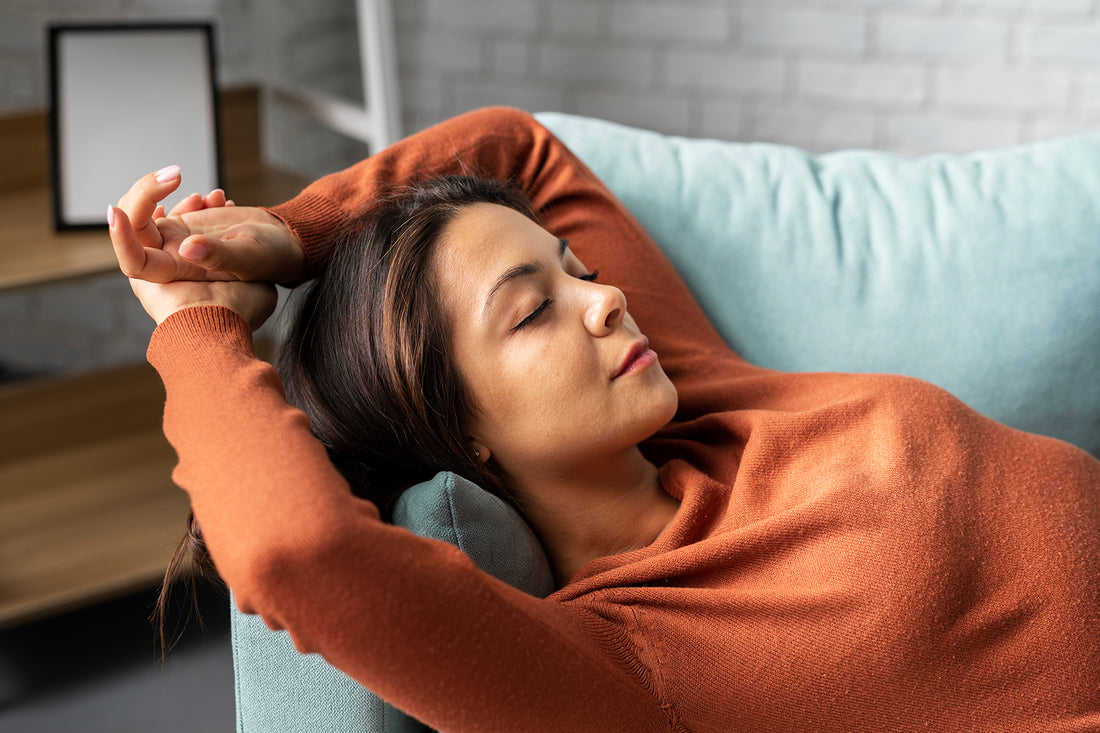You know the feeling - lying in bed, trying to drift off to sleep, but your mind is racing with thoughts, worries, and lists of things to do. As a result, you keep tossing and turning in bed for hours.
But what if there was a way to quiet your mind and effortlessly ease into a peaceful slumber? That's right—a way to calm your thoughts, relax your body, and set yourself up for a better night's rest so you can wake up feeling refreshed and rejuvenated.
Key Takeaways
-
Deep breathing, progressive muscle relaxation, and mindfulness help calm the mind and ease physical tension before sleep.
-
Writing down worries or to-do lists can offload mental clutter, making it easier to relax and transition into sleep.
-
Avoid blue light, create a cool, dark, quiet bedroom, and use calming activities like reading or listening to soothing music.
-
Consistent wind-down practices signal your body to rest, promoting faster, deeper, and more restorative sleep.
What Is Clearing Your Head Before Sleep?
Clearing your head before sleep means taking steps to calm your mind and reduce stress and anxiety. This helps promote better sleep by making it easier to fall asleep faster. It also improves the quality of your rest.
When you clear your head before bed, you let your brain wind down from the day's activities. This is achievable with relaxation techniques like deep breathing, meditation, or gentle stretching.
The goal is to create a sense of peace and tranquility, signaling to your body that it's time to sleep. Reducing mental chatter and physical tension makes it easier for your mind and body to transition into a restful state.
Why Is it Important to Clear Your Head Before Bed?
Clearing your head before bed has several benefits for sleep and overall well-being. When you go to bed with a calm and relaxed mind, you're likely to fall asleep quickly and experience deeper, more restful sleep.
Stress and anxiety are common causes of sleep disturbance. When you're worried or anxious, your body releases stress hormones like cortisol, which keep you alert and awake. This makes it difficult to relax and drift off to sleep.
Over time, poor sleep quality can lead to a host of health issues, including:
-
Weakened Immune System: Lack of sleep can impair your body's ability to fight infections and illnesses.
-
Mood Disturbances: Sleep deprivation can contribute to irritability, mood swings, and even depression.
-
Cognitive Impairment: Poor sleep can affect memory, concentration, and decision-making abilities.
-
Increased Risk of Accidents: Drowsiness and fatigue from lack of sleep can make you more prone to accidents, especially when driving or operating machinery.
When you clear your head before bed, it helps mitigate these negative effects by promoting relaxation. When you're calm and relaxed, your body easily transitions into sleep mode, allowing you to get the rest you need to function at your best.
How to Clear Your Head for Better Sleep

You can take several steps to calm your mind and relax your body before bed, setting yourself up for a restful night's sleep.
1. Practice Deep Breathing Exercises
Deep breathing is a powerful way to calm the mind and relax the body before sleep. Focusing on your breathing helps quiet racing thoughts and reduces stress and anxiety.
To get started, find a comfortable position in bed or sitting on the floor. Close your eyes and begin taking slow, deep breaths through your nose. Feel your belly expand as you inhale, and then slowly exhale through your mouth.
You can try specific breathing techniques like box breathing, where you inhale for a count of four, hold for four, exhale for four, and hold for four before repeating the cycle. Another option is the 4-7-8 method, which involves inhaling for four counts, holding for seven counts, and exhaling for eight counts.
As you focus on breathing, notice any tension in your body and consciously relax those areas. If your mind wanders, bring your attention back to your breathing. Practice deep breathing for at least five to ten minutes before bed. Over time, this simple yet effective technique can help you unwind and prepare for a restful night's sleep.
2. Try Progressive Muscle Relaxation
Progressive muscle relaxation is a simple yet effective technique for releasing tension and calming the mind before bed. It involves systematically tensing and relaxing different muscle groups throughout your body, starting with your toes and working your way up to your head.
To begin, find a comfortable position in bed or on the floor. Take a few deep breaths and focus on the sensation of your body sinking into the surface beneath you.
Start by tensing the muscles in your feet and toes, holding the tension for five to ten seconds. Then, exhale and release the tension, allowing your feet and toes to relax completely. Notice the difference between the sensation of tension and relaxation.
Move up to your calves, tensing the muscles and holding for five to ten seconds before releasing. Continue this process with your thighs, buttocks, abdomen, chest, back, arms, hands, neck, and face. Focus on each muscle group, noticing areas that feel tense or tight.
As you release the tension in each muscle group, imagine the stress and anxiety melting away. If your mind starts to wander, re-focus on the sensation of tension and relaxation in your body.
Progressive muscle relaxation can be beneficial if you carry a lot of physical tension or find it difficult to calm your mind before bed. With regular practice, this technique can be a powerful tool in your sleep toolkit, helping you unwind and drift off to a peaceful slumber.
3. Engage in Calming Activities
Reading a book, listening to soothing music, or taking a warm bath helps you unwind and clear your head. These activities provide a relaxing transition from the day's stresses to a peaceful night's sleep.
Immersing yourself in a good book can transport your mind to another world, distracting you from worries and anxious thoughts. Choose a genre that you find enjoyable, engaging, but not overly stimulating. Avoid intense thrillers or suspenseful novels that may keep your mind active and alert.
Calming music, such as classical, ambient, or nature sounds, can also help you relax and clear your head. Research shows that music with a slow tempo and relaxing melodies can reduce stress, lower heart rate, and promote feelings of calmness. Create a playlist of your favorite soothing tunes and listen to it as part of your bedtime routine.
Similarly, a warm bath or shower before bed can be an effective way to unwind and clear your mind. The warm water helps relax tense muscles, while the steam opens up the airways and promotes deeper breathing. Add some Epsom salts or essential oils like lavender or chamomile to enhance the relaxing effects.
As you engage in these calming activities, focus on the present and the sensations you experience. Notice the feel of the pages beneath your fingers as you read, the melody of the music as it fills your ears, or the warmth of the water as it envelops your skin. Take it all in and notice the sense of peace and tranquility.
4. Write Down Your Thoughts
If worries or racing thoughts keep your mind active at night, write them down in a journal or notebook. This simple act can help you let go of mental clutter and relax.
When you’re tossing and turning in bed, sit up and write down whatever is on your mind. Don't worry about grammar, spelling, or organization – the goal is simply to get your thoughts out of your head and onto a paper.
Creating separate lists for worries, tasks, and random thoughts may be helpful. This way, you categorize your concerns and prioritize what needs to be addressed during waking hours.
If certain worries feel particularly pressing, you can also write down a brief action plan or solution. This helps you feel more in control and less anxious about the future.
After you've finished writing, take a few deep breaths and visualize your worries and thoughts drifting away with each exhalation. Close your journal, turn off the light, and settle back into bed, focusing on the present.
With regular practice, this simple yet effective technique can help you clear your head and drift off to a peaceful slumber.
5. Practice Mindfulness or Meditation
Mindfulness and meditation can help calm the mind and reduce stress. These practices involve focusing on the present moment and observing your thoughts (introspection).
To get started, find a comfortable sitting position or lie down in bed. Close your eyes and bring your attention to your breath. Notice the sensation of the air moving in and out of your nostrils or the rise and fall of your chest.
As thoughts come to the fore, acknowledge them without getting caught up in their content. Gently redirect your focus back to your breathing. You can silently repeat a calming phrase or mantra, like "inhale peace, exhale stress" or "I am calm and relaxed."
Guided meditations can also be helpful. These recordings provide step-by-step instructions and gentle prompts to help you stay focused and relaxed.
Aim for at least five to ten minutes of mindfulness exercises or meditation before bed. Over time, you can extend your practice and enjoy even greater benefits for sleep and overall well-being.
6. Avoid Screens Before Bed
The blue light emitted by electronic devices like smartphones, tablets, and computers can interfere with your body's natural sleep-wake cycle, making it harder to clear your head and fall asleep. Studies suggest that exposure to blue light in the evening can suppress the production of melatonin, the hormone that regulates sleep.
To minimize the impact of blue light, avoid using electronic devices at least an hour before bedtime. Instead, engage in calming activities like reading a book, listening to soothing music, or practicing relaxation techniques.
If you must use a device before bed, consider using blue light-blocking glasses or installing a blue light filter app on your phone or computer. These tools reduce the amount of blue light emitted by electronic devices.
It's also a good idea to keep your bedroom a screen-free zone. Remove televisions, computers, and other electronic devices from your sleep space to create a peaceful, relaxing environment.
7. Create a Relaxing Sleep Environment
A dark, quiet, cool bedroom promotes relaxation and helps clear your head. Invest in comfortable bedding and pillows to create a cozy sleep space that promotes rest and tranquility.
Darkness signals your body that it's time to sleep, so use blackout curtains or an eye mask to block out light. If you need a nightlight for safety, choose one with a red or amber hue, as these colors are less disruptive to your sleep-wake cycle than blue or white light.
Noise can also hinder you from falling asleep. So, use earplugs or a white noise machine to drown out disruptive sounds from outside or inside your home. You can also play soothing nature sounds or calming music to create a peaceful ambiance.
The temperature of your bedroom also affects your ability to relax and clear your head before sleep. The ideal sleep temperature is between 60 and 67 degrees Fahrenheit, as a cooler environment helps your body to wind down and prepare for rest.
Accordingly, adjust your thermostat, use a fan, or choose breathable bedding to create a comfortable sleep environment.
Finally, ensure your mattress and pillows provide adequate support and comfort for your body. A mattress that's too soft or firm can cause aches and pains, making it harder to relax and clear your head before sleep. Similarly, pillows that are too high or too low can strain your neck and shoulders, leading to discomfort.
8. Try Natural Sleep Aids
Natural sleep aids can promote relaxation and improve sleep quality. CBD, a non-psychoactive compound in hemp plants, may help reduce anxiety, relieve pain, and promote better sleep.
Our CBD Sleep Gummies are a convenient and tasty way to incorporate CBD into your bedtime routine. They contain a blend of CBD and other natural ingredients like L-theanine and ashwagandha, which have been used for centuries to promote relaxation and improve sleep.
Our Multifunctional CBD Softgels are another excellent option for people looking to clear their heads and get a better night's rest. These Softgels combine CBD with other cannabinoids, like CBN and CBG, to enhance CBD's calming and sleep-promoting effects, and they're designed with time-release effects to ensure they'll last you all night long and prevent waking during the night.
When using CBD for sleep, look for high-quality, third-party-tested products from reputable brands. Also, start with a low dose and gradually increase as needed, paying attention to how your body responds.
It's also a good idea to talk to your healthcare provider before starting any new supplement regimen, especially if you have underlying health conditions or are taking medications. They can help determine what CBD is right for you.
The Benefits of Clearing Your Head for Better Sleep
Clearing your mind before sleep helps improve overall well-being. A calm mind reduces stress and anxiety, allowing you to fall asleep faster and enjoy a deeper, more restorative rest. This leads to enhanced mental clarity, better mood, and improved physical health.
-
Improved Sleep Quality: A clear mind promotes uninterrupted sleep cycles, helping you wake up refreshed and energized.
-
Enhanced Mental Health: Regular restful sleep reduces stress hormones and supports emotional stability.
-
Increased Productivity: A well-rested mind is more focused and efficient in tasks, boosting daily productivity.
-
Positive Outlook: Consistent quality sleep fosters a more optimistic view of life, as sleep is closely linked to mood regulation.
Sleep is vital in maintaining your health and emotional balance. So, getting a calmer mind before bed is a simple way to support these benefits.
Final Thoughts
Calming your mind is a simple and effective way to improve sleep quality. The good news is that you can achieve this by incorporating relaxation techniques and establishing a calming environment that supports better sleep. When necessary, natural sleep aids can help you unwind and relax.
R&R CBD offers solutions that align with these needs. We provide all-natural CBD products designed to help people achieve a peaceful night's sleep. Our Sleep Solutions are tailored to help you relax and rest effectively.
Check us out today and experience the natural healing power of CBD.
Frequently Asked Questions
How Can I Clear My Mind to Sleep?
Clearing your mind before sleep can help create a relaxing bedtime routine. Writing down thoughts or worries in a journal can also help offload mental clutter. Reducing screen time and avoiding stimulating activities close to bedtime are effective strategies to calm the mind.
How Do I Sleep with an Empty Head?
Sleeping with an “empty head” is not about eliminating all thoughts but quieting the mind enough for relaxation. Engaging in calming activities, practicing relaxation techniques, and maintaining a consistent sleep schedule can create the mental state needed to sleep more easily.
Why Is My Brain so Active when I Try to Sleep?
Your brain can become more active due to stress, anxiety, or overstimulation. Creating a wind-down routine and managing stress throughout the day can help reduce this nighttime mental activity.



































